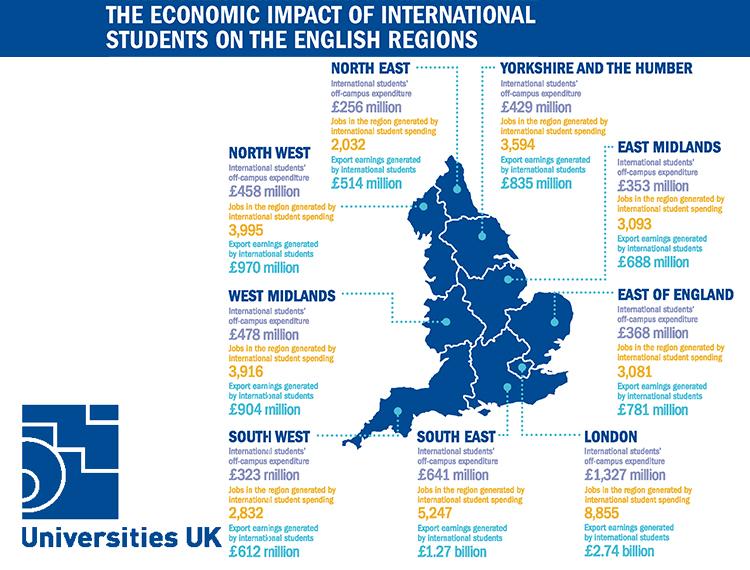Government wasting time by chasing after non-existent student visa overstayers, says IPPR

International students coming to the UK to study now generate more than £25 billion for the economy and provide a significant boost to regional jobs and local businesses.
Research into “The Economic Impact of International Students” – conducted for Universities UK by Oxford Economics (March 2017) – shows that in 2014–15, spending by international students supported 206,600 jobs in university towns and cities across the UK.
In total, the analysis found that, in 2014–15, on-and off-campus spending by international students and their visitors generated a knock-on impact of £25.8 billion in gross output in the UK. The spending of international students is additional to that of UK residents so provides an export boost to the UK. In 2014–15 they were responsible for £10.8 billion of UK export earnings.
As well as tuition fee payments, international students spend money off-campus on a wide range of goods, services, and activities. This amounted to £5.4bn in 2014–15. The transport and retail sectors are significant beneficiaries of international students’ spending. Their off-campus spending added £750 million to the UK transport industry and £690 million to the retail industry.
International students also attract a significant number of overseas visitors during their time studying in the UK. The expenditure of these friends and relatives, at hotels, restaurants, and attractions also makes a significant contribution to the economy.
The UK is currently the second most popular destination for international students after the United States and attracts a substantial number of overseas students each year. In 2014-15 the 437,000 international students studying in the UK (EU and non-EU) made up 19% of all students registered at UK universities.
This UK-wide impact is mirrored at a regional and local level. For example, in the North West of England, international students’ off-campus expenditure was £458 million in 2014–15, generating a £281 million contribution to local GDP and 3,995 full-time jobs. The analysis includes figures for all nine regions in England.
Responding to the Government’s commitment to a detailed study on international students, as Amber Rudd announces a review into the impact of foreign students on the UK.
 Liberal Democrat Shadow Home Secretary Ed Davey commented:
Liberal Democrat Shadow Home Secretary Ed Davey commented:
Image courtesy of the Liberal Democrats
“International students bring huge benefits to the UK economy and help our universities thrive – after which the vast majority leave the country.
“Yet for too long the Conservatives have preferred an arbitrary immigration target that ignores these benefits and the fact these students are temporary migrants only.
“I hope when the conclusions of this overdue analysis are published, reason and evidence will finally triumph over the Conservatives’ headline-grabbing, prejudice-appeasing nonsense. This must include dropping overseas students from official immigration statistics.
“Higher education is one of Britain’s most successful export industries. We must not let it be destroyed by the Conservatives’ short-sighted obsession with immigration targets.
“It is yet to be seen whether Amber Rudd will overcome the ambition-based objections of her predecessor Theresa May.”
 Alistair Jarvis, Chief Executive of Universities UK, commented:
Alistair Jarvis, Chief Executive of Universities UK, commented:
“We welcome the Government’s commitment to a detailed examination of the net benefits of international students. This is an opportunity to build on the considerable evidence that shows that international students have a very positive impact on the UK economy and local communities.
“Recent research by Oxford Economics showed that international students generate more than £25 billion for the economy and support over 200,000 jobs in communities across the UK.
“International students also enrich our campuses and the experience of UK students, culturally as well as economically. Many return home having built strong professional and personal links that provide long term soft-power benefits to the UK.”
Nearly three-quarters (73%) of the British public would like to see the same number or more international students coming to study in the UK, after discovering the contribution they make to the economy and the jobs they generate.
Only 4,600 international students overstayed their visas last year, less than a twentieth of the previous estimates of 100,000, official figures released today have revealed.
New statistics, released today (24 Aug) by the Office for National Statistics (ONS) indicate that in the year ending March 2017 total long-term net migration to the UK was 246,000, compared to 327,000 in the year ending March 2016. This is driven largely by a fall in net migration of EU citizens of 51,000 (particularly A8 citizens from Eastern European accession countries).
For the first time figures have been publish based on exit checks from UK ports, showing that 97 per cent of foreign students left the UK after finishing their studies. The Conservatives threat to crack down on foreign students should be called off immediately.
IPPR’s recent research on international students found that the International Passenger Survey (IPS), the key source for the migration statistics and the government’s policy on international students, could be overestimating the number of students who stay on in the UK after completing their studies by many tens of thousands. IPPR found that the IPS data does not tally with other data sources on international students, including the Home Office’s visa data, the Annual Population Survey, and the Higher Education Statistics Agency (HESA’s) Destination of Leavers Survey. Today (24 Aug) the ONS analysis has confirmed as correct the view that there is strong evidence to suggest that the IPS is underestimating student emigration.
Responding to the Home Office exit check report and ONS student migration reports,
 Liberal Democrat Leader Vince Cable commented:
Liberal Democrat Leader Vince Cable commented:
Image courtesy of the Liberal Democrats
“This debacle happened on Theresa May’s watch at the Home Office. I spent five years in coalition battling her department’s bogus figures on this issue but she responded by erecting a wall of visa restrictions on an entirely false basis.
“Cabinet Brexiteers fought a referendum campaign on a flawed prospectus, scapegoating foreign students who weren’t even here, and demonising EU citizens who are now leaving the country voluntarily.
“No wonder the government has announced a review into the impact of foreign students because its economically disastrous policy was based on figures that were out by 96%.
“As we argued repeatedly with Theresa May, overseas students bring huge economic benefits to universities and the broader economy. It makes no sense for students to be included in official immigration statistics.
“Higher education is one of Britain’s most successful export industries, we must not let it be destroyed by the Conservatives’ short-sighted obsession with immigration targets based on spectacularly wrong data.”
Alistair Jarvis, continued:
“These two official reports show that there is very high visa compliance by international students. The number of students overstaying their visas is a tiny fraction of previous (incorrect) claims.
“International students make a vital contribution to the UK economy, enrich our campuses and the experience of UK students culturally as well as economically. It is crucial that future student visa policy is developed using robust data. This should be coupled with a positive international communications campaign led by government to highlight that international students are welcomed and valued visitors to the UK.
“The ONS’ commitment to improve the immigration data to inform the future understanding of student migration patterns is very welcome. Universities UK are ready to assist the ONS and the Home Office in this work. Any future decisions on international student visa policy must not be based on the International Passenger Survey data.”
 Marley Morris, IPPR Senior Research Fellow, commenting on today’s long-term immigration statistics from the ONS, said:
Marley Morris, IPPR Senior Research Fellow, commenting on today’s long-term immigration statistics from the ONS, said:
“Today’s latest analysis suggests that far fewer international students are overstaying their visas than the government originally thought.
“This follows IPPR’s own research last year (‘Destination Education’), which found that the non-EU student emigration figures are likely to underestimate the number of students leaving the UK.
“If the Home Office continues to rely on this data to inform a restrictive policy on international students, then it is in all likelihood spending valuable government time and resources on a problem that simply does not exist.
“Given this new revealing analysis from exit checks data, the government should now urgently explore ways to remove students from the migration target altogether.
“The latest data from the ONS also finds that net inflows of EU migrants have fallen substantially over the past year. There is a risk that, without clear guidance soon to provide certainty to EU nationals currently residing in the UK, we could face a ‘brain drain’ of EU talent before Brexit even takes place.”
The research found that, in 2014-15:
- International students paid an estimated £4.8 billion in tuition fees to UK universities. This accounts for over 14% of total university income. Some 88% – £4.2 billion – of this fee income was paid by students from outside the EU
- As well as university fees and accommodation, international students spent £5.4 billion off-campus on goods and services
- Spending by international students supported 206,600 jobs all over the UK
- Visitors to international students in the UK spent an estimated £520 million – benefitting in particular the transport, hotels, hospitality, cultural, recreational and sports attraction sectors – generating an estimated knock-on impact of £1 billion in gross output
- Taking their university payments, off-campus spending, and the spending of their visitors together, international students generated £25.8 billion in gross output
- International students were responsible for £10.8 billion of UK export earnings
- The economic activity and employment sustained by international students’ off campus spending generated £1 billion tax revenues. This is the equivalent to the salaries of 31,700 nurses or 25,000 police officers
Dame Julia Goodfellow, said: “These figures highlight the enormous economic contribution international students now make to UK plc and to jobs and communities in every region of the UK.
“The spending of international students and their visitors now provides a major export boost for the UK economy. This is not something limited to London or to one or two big cities, but to towns and cities across the UK.
“While this report focuses on economic impact, it is important to remember that international students also enrich our campuses and the experience of UK students, both academically and culturally. Many return home having built strong professional and personal links here that provide long-term, ‘soft power’ benefits for the UK.
“Our world-class higher education sector is one of the UK’s outstanding success stories. We have the second largest share of the global market, behind only the USA. This is a potential growth area and there is scope for the UK to welcome more qualified international students and build on this success. To do this, we must present a welcoming climate for genuine international students and ensure that visa and immigration rules are proportionate and communicated appropriately. This will be even more important as the UK looks to enhance its place in the world post-Brexit.”
About Universities UK: The representative organisation for the UK’s universities. Founded in 1918, its mission is to be the definitive voice for all universities in the UK, providing high quality leadership and support to its members to promote a successful and diverse higher education sector. With 135 members and offices in London, Cardiff (Universities Wales) and Edinburgh (Universities Scotland), it promotes the strength and success of UK universities nationally and internationally.











Responses